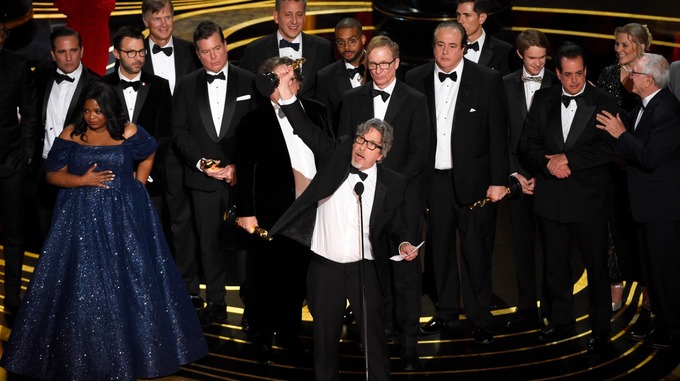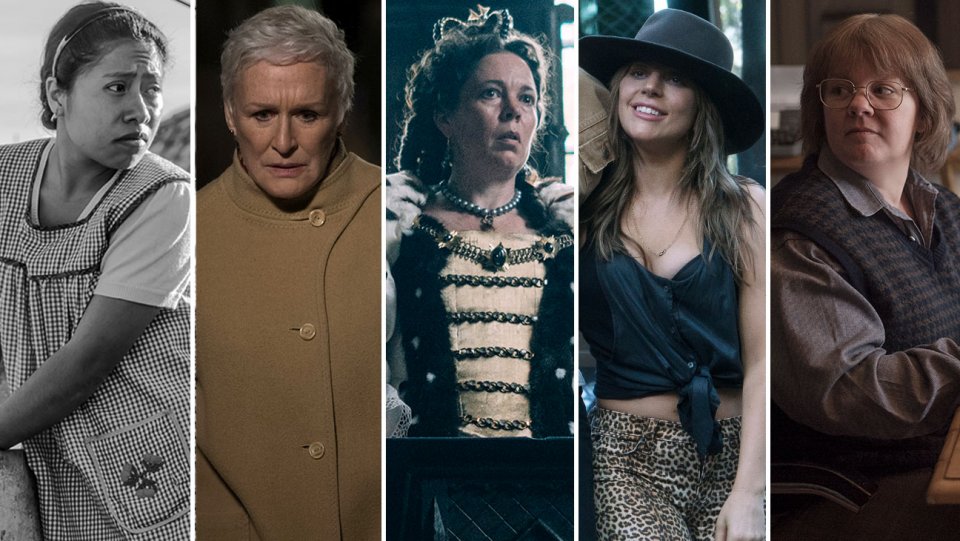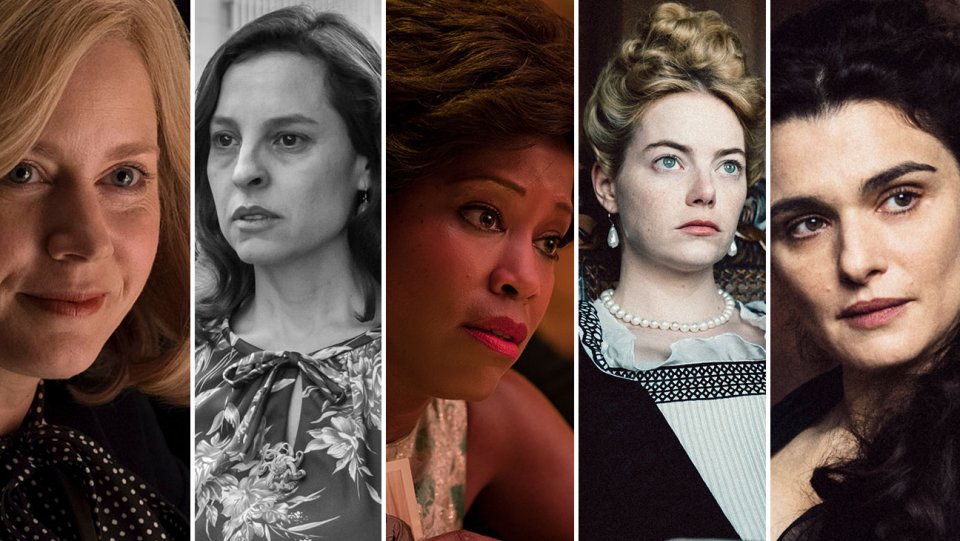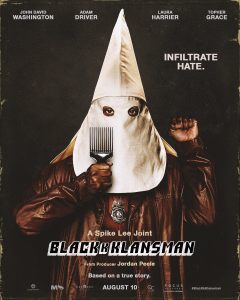Home » Posts tagged 'Roma'
Tag Archives: Roma
Oscar Reflections

I know, I know, the awards were ages ago. I’ve been busy, whaddya want? Despite the various changes that took place, I enjoyed the Oscars ceremony. The absence of a host did not adversely affect things, although the opening speech from Maya Rudolph, Tina Fey and Amy Poehler suggested that any or all of these comedians would make excellent hosts in the future.

Other presenters were also entertaining, and it was especially pleasing to see the acting winners of last year presenting the awards for this year in pairs, Gary Oldman and Alison Janney presenting Leading Actor to Rami Malek for Bohemian Rhapsody while Francis McDormand and Sam Rockwell presented Leading Actress to Olivia Colman for The Favourite, whose acceptance speech was one of the most moving.

Alfonso Cuarón spent a lot of time on the stage, winning three awards personally for Roma, Foreign Language Film, Cinematography and Directing, the last of which was affectionately presented to him by his friend and last year’s winner, Guillermo Del Toro.

Performance highlights included the various nominees for Original Song, especially the eventual winner of this award, ‘Shallow’ (from A Star Is Born) performed by Lady Gaga and Bradley Cooper. Melissa McCarthy and Brian Tyree Henry appeared in hilarious costumes that incorporated elements of all the nominees for Costume Design, was another highlight.
Some of the most significant speeches came from the newcomers, especially those in the Short Film categories. For their winning Documentary (Short), Period. End of Sentence, Rayka Zehtabchi and Melissa Berton gave an impassioned and empowering speech about women’s rights and the need for films like theirs to get this kind of attention. Similarly, Domee Shi and Becky Neiman-Cobb were inspiring as they received the award for Short Film (Animated) for their charming Bao. And with his first competitive Oscar win, Spike Lee gave a jubilant celebration alongside his co-winners Charlie Wachtel, David Rabinowitz and Kevin Willmott, seeming to climb up the much longer form of his friend Samuel L. Jackson to receive a congratulatory embrace.
As is often the case, however, the Oscars are dogged with as much controversy as glamour. The most heated debate has been around Best Picture, and with good reason. In a year when such unusual fare as Roma and The Favourite and such provocative offerings as BlacKkKlansman were in contention, for the Academy to reward Green Book feels like a conservative cop-out. I don’t think Green Book is a bad film, but it seems remarkably unremarkable. Little in its subject matter or film style stood out, especially in comparison to the distinctive style and unusual content of the films mentioned above.

As is so often the case, the suspected politics of the Oscars are illuminating. Green Book presents a very simplistic view of US race relations, and it has been described disparagingly as Driving Miss Daisy with the racist in the front. Green Book charts the resolution of racism through a tale of one white man shaking off his prejudices, and in doing so saves a black man with companionship. It’s a white saviour story, where the journey of the white saviour is more prominent than that of the black man who is ‘saved’. It is therefore easy to see why Green Book’s victory annoyed Spike Lee as well as others. I won’t say I’m angry, but I am disappointed that after radical and surprising choices in recent years, Green Book feels like a Best Picture winner from earlier, safer times. Wackier choices next time, I hope.

91st Annual Academy Awards: Part Three – Acting Out

Leading Actress
Yalitza Aparicio for Roma
Glenn Close for The Wife
Olivia Colman for The Favourite
Lady Gaga for A Star is Born
Melissa McCarthy for Can You Ever Forgive Me?

She’s won it all so far – Golden Globe, SAG and BAFTA – and there’s no reason not to expect Olivia Colman to continue her winning ways. I love Colman in The Favourite, but Yalitza Aparicio’s performance in Roma does something even more special, conveying so much with little gestures and body language. Plus it would be nice for an indigenous performer to win an award. I suspect we will see Queen Anne getting an Oscar though.
Prediction – Olivia Colman
Preferred winner – Yalitza Aparicio

Leading Actor
Christian Bale for Vice
Bradley Cooper for A Star Is Born
Willem Defoe for At Eternity’s Gate
Rami Malek for Bohemian Rhapsody
Viggo Mortensen for Green Book

Bohemian Rhapsody had two elements that impressed me. One was the music, for which I will credit Queen. The other is Rami Malek’s performance as Freddie Mercury, which is pretty brilliant. After his victories at the Golden Globes and BAFTA, I see no reason not to expect Malek to add to his collection. But if it were me, I would vote for Christian Bale’s transformation into the devious, manipulative slug of Dick Cheney in Vice.
Prediction – Rami Malek
Preferred winner – Christian Bale

Supporting Actress
Amy Adams for Vice
Marina de Tavira for Roma
Regina King for If Beale Street Could Talk
Emma Stone for The Favourite
Rachel Weisz for The Favourite

Prediction – Regina King
Preferred winner – Rachel Weisz
The smart money appears to be on Regina King, and I am yet to see If Beale Street Could Talk (I suspect it can). Having seen the others, Rachel Weisz did do something special in The Favourite, and I’d be OK with her becoming a two-time winner.

Supporting Actor
Mahershala Ali for Green Book
Adam Driver for BlacKkKlansman
Sam Elliott for A Star is Born
Richard E. Grant for Can You Ever Forgive Me?
Sam Rockwell for Vice

Having not seen Green Book (yet), I predict that Mahershala Ali will add to his collection. But personally, I was touched by San Elliott’s quiet gruffness in A Star Is Born, and of those I have seen, probably vote for him.
Prediction – Mahershala Ali
Preferred winner – Sam Elliott

91st Annual Academy Awards: Part Two – Pictorial Direction

Recently, I took on a new job which takes up rather a lot of my time. Therefore, I haven’t posted as much as I, and you, my devoted fans, would like. With the Oscars just around the corner, here’s my quick predictions for the awards, and a few of my own thoughts on them.
Picture

Green Book

I’ve see all but one of these (hopefully get to Green Book one day). All have their strong points, some more than others. My personal favourite film of last year is up for multiple awards, but after its success at the BAFTA awards, I think this year AMPAS will, for the first time, award a film not in the English language the coveted prize of Best Picture. Roma is a magnificent piece of work that makes the ordinary extraordinary, all through the power of cinema. For that, I see AMPAS voting for Roma as Best Picture, and also Best Foreign Language Film for good measure.
Prediction – Roma
Preferred winner – BlacKkKlansman

Directing

Alfonso Cuarón for Roma
Yorgis Lanthimoss for The Favourite
Spike Lee for BlacKkKlansman
Adam McKay for Vice
Pawel Paliwkowski for Cold War
Much like Best Picture, I think the Academy will reward Roma, not least for the amazing direction and indeed multi-tasking of Alfonso Cuarón. I would personally vote for Spike Lee for his disruption of cinematic norms, but I see Cuarón picking up his second golden baldie.
Prediction – Alfonso Cuarón
Preferred winner – Spike Lee

Roma
 Sometimes a film sells itself to you in its first moments. From its opening credits, Roma had me transfixed by a sequence of water rinsing a floor, while a plane passing overhead is reflected on the water. This prolonged sequence highlights the beauty in the mundane and the extraordinary appearance of the ordinary, as Alfonso Cuarón’s tale of domesticity is rendered epic through the magic of cinema. Covering the life of a Mexican family in the early 1970s, largely from the perspective of maid Cleo (Yalitza Aparicio), writer/director/cinematographer/editor/producer Cuarón renders a story that is intimate and grandiose all at once. Domestic dramas are juxtaposed with political upheaval, familial fractures blend with social commentary. Cuarón utilises monochrome, deep focus photography, long takes and often pans to capture the full extent of the action. These long panning takes are the film’s great strength, as they convey the texture of life passing from one aspect to another, showing the shocking and gripping alongside the heartwarming and touching, the major flowing seamlessly to the minor. Roma is a true cinematic wonder, a reminder of what film can do using its essential elements, a work of art that recalls and reasserts the wonder of those early flickering marvels at the end of the 19th century.
Sometimes a film sells itself to you in its first moments. From its opening credits, Roma had me transfixed by a sequence of water rinsing a floor, while a plane passing overhead is reflected on the water. This prolonged sequence highlights the beauty in the mundane and the extraordinary appearance of the ordinary, as Alfonso Cuarón’s tale of domesticity is rendered epic through the magic of cinema. Covering the life of a Mexican family in the early 1970s, largely from the perspective of maid Cleo (Yalitza Aparicio), writer/director/cinematographer/editor/producer Cuarón renders a story that is intimate and grandiose all at once. Domestic dramas are juxtaposed with political upheaval, familial fractures blend with social commentary. Cuarón utilises monochrome, deep focus photography, long takes and often pans to capture the full extent of the action. These long panning takes are the film’s great strength, as they convey the texture of life passing from one aspect to another, showing the shocking and gripping alongside the heartwarming and touching, the major flowing seamlessly to the minor. Roma is a true cinematic wonder, a reminder of what film can do using its essential elements, a work of art that recalls and reasserts the wonder of those early flickering marvels at the end of the 19th century.
91st Academy Awards: Part One – Art and Politics

The other day, a cat offered its opinion on the Oscar nominations. At any other time, this would seem strange, but Oscar season is when all opinions on film quality and aesthetic worthiness become, according to all and sundry offering opinions, The Truth. Whatever the Academy of Motion Picture Arts and Sciences nominates for awards, everyone from a broadsheet critic to a tweeting cat knows better.

I have opinions on the nominations, but I’m more interested in what they represent rather than knowing, let alone deciding, The Truth about the best films of last year. I am pleased to see some of my favourites from last year nominated, and while other top films of mine have been largely or entirely overlooked, I don’t think the Academy members are wrong, just have different views. In the run up to the awards, I’ll post my views and predictions on the various nominees, but for starters, let’s consider the nominees for Best Picture.

The dominant story around the nominations is the inclusion of Black Panther. The first superhero film to receive this accolade, it is also a significant black film. A blockbuster with a predominantly black cast, that succeeded critically and commercially with its incorporation of commentary about racial history and isolationism, the nomination of Black Panther is a hugely significant cultural event. Criticism of this nomination is largely based around the film’s lack of aesthetic quality: seemingly the film ‘is not really good enough’ to be nominated.

These criticisms do not specify the standards by which film quality should be measured, and imply elitist attitudes against blockbusters and superhero films in general. This cultural prejudice is interesting, since while less harmful, it is no less a prejudice than that based on skin colour. Artistic merit is subjective, and while there may be critical standards that could be considered objective, perhaps from the practitioners such as editors and cinematographers, these standards are unlikely to be universally accepted. Therefore, it seems more appropriate, and certainly less arrogant, to embrace the various subjective positions and accept the wonderful diversity of perspectives.

Speaking of diversity, I wonder if a predominantly white superhero film would have attracted such discussion. The nomination of Black Panther probably is more a political statement than an artistic one, as the members of AMPAS present themselves as progressive. The other nominees also suggest this different approach, with only two of the Best Picture nominees focused upon white men. Of these, I am yet to see Vice so will post my review subsequently, but at the very least it seems to be a satire of conservative white power, a point underscored by Christian Bale’s acceptance speech at the Golden Globes.
A Star Is Born is probably the most traditional and conservative of the nominees, being a remake of a popular rags-to-riches story in which a man helps a woman while wrestling with his personal demons. I loved the film and have no problem with it being nominated, but I am glad it is the only typical nominee. The biopic Bohemian Rhapsody is also typical, but its focus on a gay musician of Asian descent makes it unusual. Films focused on gay characters have received limited awards attention, Philadelphia, Brokeback Mountain and Moonlight being earlier examples. I’m not the biggest fan of Bohemian Rhapsody, and controversy around its director may keep it out of the frontrunning, but I applaud its inclusion.
Another film with homosexual elements is The Favourite, a surprising inclusion because of its focus upon women but also because it is such an odd film. ‘Costume dramas’ do attract attention – see Sense & Sensibility, Elizabeth, Shakespeare In Love – but rarely with this level of frank sexuality and dark comedy. To me, it is another weird choice, and all the better for it. Roma I am yet to see, but from a racial and gender perspective it is refreshing to see a film about a working-class woman in Mexico recognised. Green Book casts an eye over American racial history, much like Driving Miss Daisy, 12 Years A Slave and Hidden Figures, and once I’ve seen it I’ll let you know what I think.
Speaking of American racial history, I am thrilled to see my favourite film of last year nominated in multiple categories. BlacKkKlansman draws attention to important events with contemporary parallels, while engaging with and subverting cinematic norms. Spike Lee has long been a public face of African-American cinema, and Academy recognition brings attention to this important film.

It is easy to read many of the nominations as political. I do not see this as a problem. Film and the film industry are political, and in an age of social media everyone can be politically engaged. By engaging with debates over representation through their attention to films that address gender, race and sexuality, the members of AMPAS demonstrate social engagement. Ironically, to perpetuate lofty and undefined levels of ‘artistic quality’ would be more elitist and out of touch, as AMPAS has long been accused of. This is a radical time, and what we see in these nominations are contributions to debate and discussion. One of the most prominent platforms in the world is contributing to the debate, and that is something I applaud.











